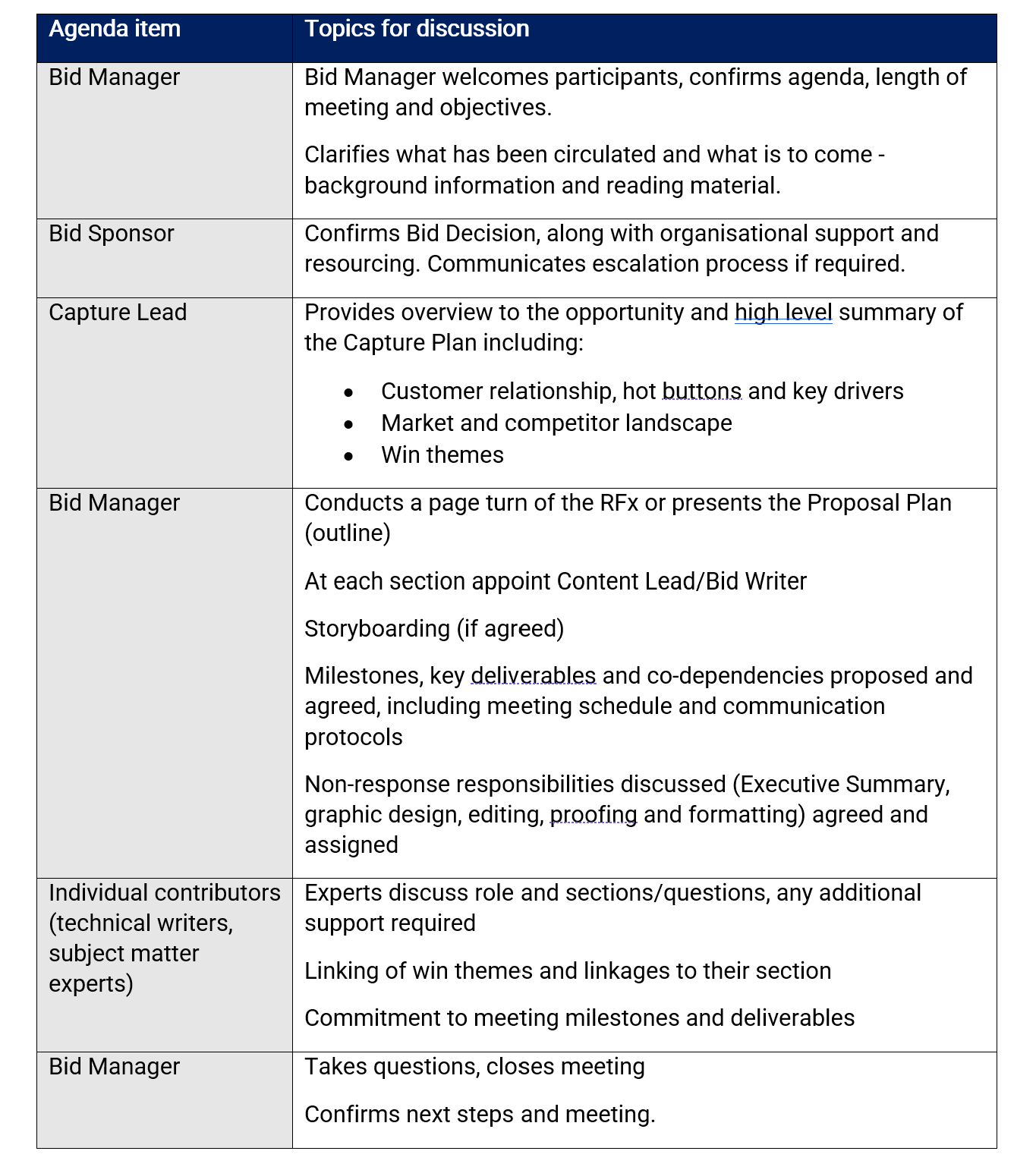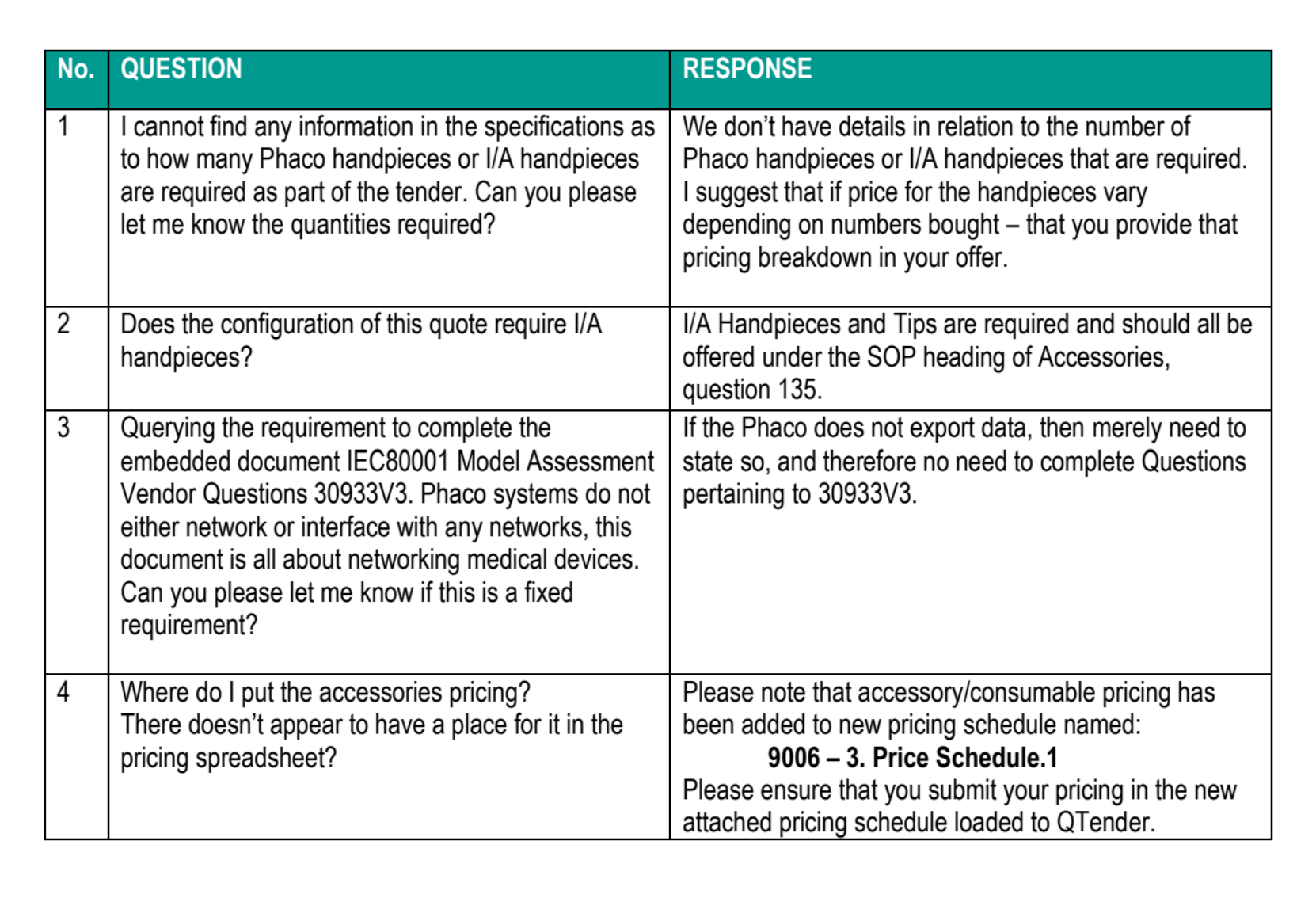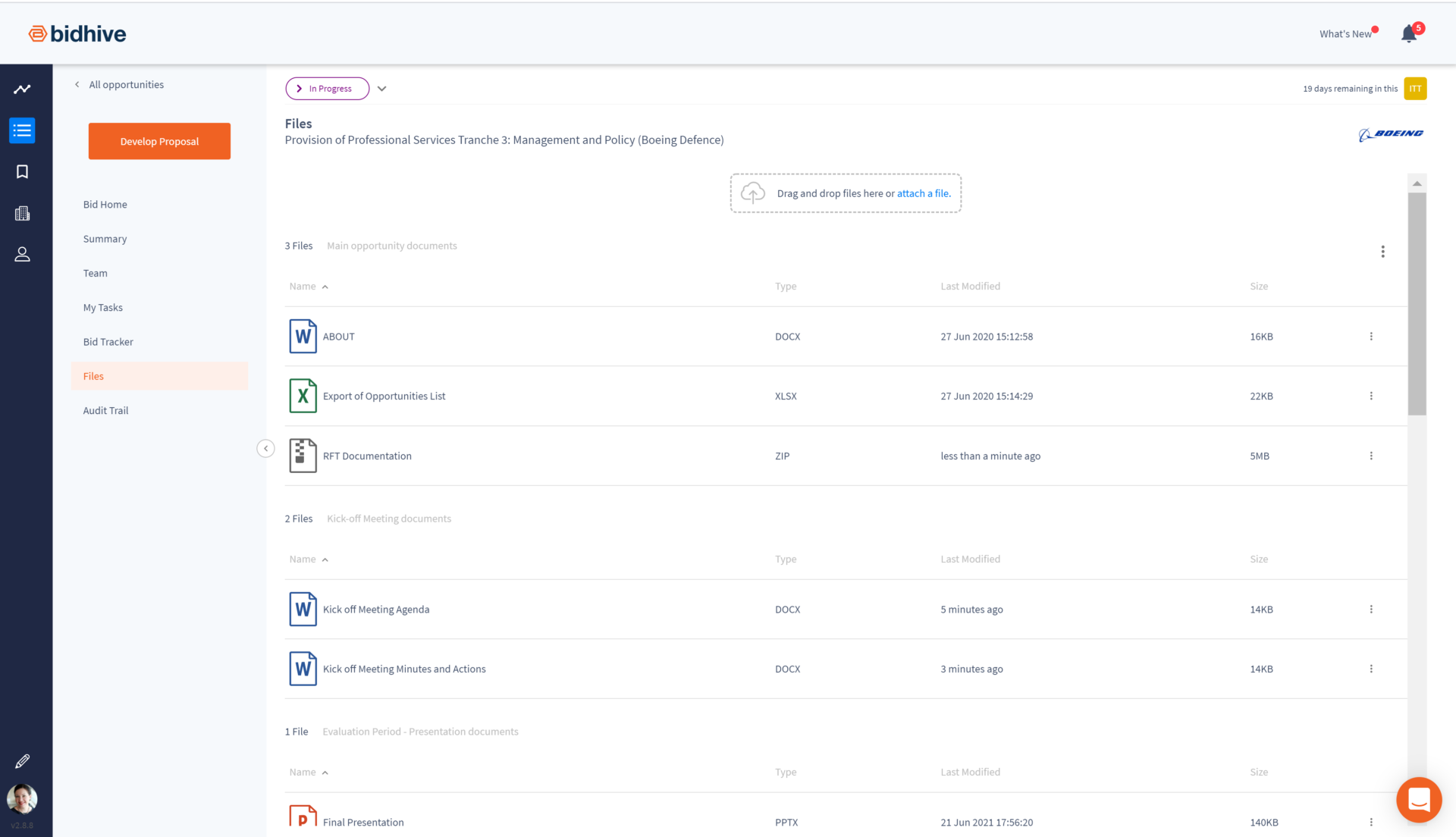Kick Off Meeting – Setting the win strategy
Why is it important?
The Kick Off Meeting is no ordinary meeting. It sets the bid on the path to success and is the critical meeting or workshop that brings your subject matter, technical and bid writing experts together to get them on board with the bid management and proposal process.
If you’ve already done your Capture Plan and qualified the opportunity, the arrival of the RFx document simply provides the green light to pursue it.
At this stage the bid manager should have already registered the bidding opportunity, gained a good understanding of the requirements and allocated resources against the timeline schedule. They should also have worked through a preliminary Bid/No Bid evaluation and understand what the likely outcome will be.
If the tender is likely to be a No Bid but is not yet confirmed, the team attending the Kick Off Meeting will probably be a more compressed team of decision makers, including subject matter experts to discuss the scope of work, the technical, commercial and legal requirements, and confirm aspects of compliance or non-compliance.
Kick off meeting objectives
The purpose of the kick off meeting is to:
- Agree on the win themes and commercial strategy
- Communicate RFx instructions and compliance requirements
- Agree on roles, responsibilities, deliverables and timelines
- Discuss the proposed solution and any challenges.
So, given the objectives, who are the key people to have there?
Essential tools
Holding your Kick Off Meeting
Early planning improves communication and reduces stress later in the bid process. It also ensures you are focusing your efforts on a winning strategy before you dive into the writing.
The Kick Off Meeting will help everyone get on the same page and ensure the best bid is presented, that information is consistent and prepared on time.
- Distribute the RFx ahead of time, and include a summary of the bid requirements if this is your usual practice. Ensure one person in the bid team (usually the bid manager) has read all of the documentation including the Conditions of Contract.
- Invite the right people and make it mandatory.
- Present the Capture Plan – the background and the opportunity, an overview of the customer – history, any relationships, strategic priorities or hot buttons, any initial the brainstormed or proposed solution and approach.
- Identify any questions to be directed to the procurement contact or probity officer (if so, what is the deadline for questions and answers).
- Discuss sources of evidence that can be provided of previous experience, expertise and success.
- Assign roles and responsibilities to each team member and identify who will be responsible for contributing to each part of the response (this may have been prepared in advance by the bid manager).
- Confirm the response timeline and schedule including deliverables and milestones, review points (this may have been prepared in advance by the bid manager).
- Develop winning bid strategies and refine win themes.
- Document the strategy points, any mandatory criteria, watch points, key themes/messages and differentiators/discriminators.
Who should attend the Kick Off Meeting?
Key people involved in the proposal process should be invited to the Kick Off Meeting – from management (the bid sponsor) to subject matter/technical experts to the commercial lead, operations lead, and other key contributors, writers, reviewers and approvers.
If you are involving third parties, you may wish to invite them too, or consider running a separate briefing for them, but ensure they know tasks, milestones and deliverables.
The Bid Manager is usually tasked with running the Kick Off Meeting, and driving the bid process from now until the submission, and then the post-submission activities to log the outcome and lessons learned.
The Kick Off Meeting is important to ensure that everyone understands the process, the schedule and milestones, their roles and responsibilities, they’ve tabled their questions, and the key messages. Having management buy-in to the process also ensures everyone involved is on board and committed to the proposal task.
The Bid Manager should circulate and work to the agenda, and can delegate meeting tasks, and/or a Writer’s Package. Below is an example of a kick off meeting agenda.
 The kick-off meeting should last no longer than 2 hours. Senior staff who will be involved in the reviewing and approving may attend the main briefing sessions on the opportunity background, strategy and timeline, while contributors will attend the whole meeting to understand more detail about the storyboarding and writing tasks ahead.
The kick-off meeting should last no longer than 2 hours. Senior staff who will be involved in the reviewing and approving may attend the main briefing sessions on the opportunity background, strategy and timeline, while contributors will attend the whole meeting to understand more detail about the storyboarding and writing tasks ahead.
TIP: The bid manager will prepare a timeline showing all the tasks, milestones and individuals responsible for each. This can be produced in a spreadsheet or using a tool such as the Bidhive Bid Tracker.
Communicate RFx instructions and compliance requirements
You can use the Kick Off Meeting to present the response document structure and format with the core and/or broader team, focusing on specific instructions for main sections and sub-sections.
Now is the time to identify and collate any issues or questions relating to the RFx that could be raised at an industry briefing or be submitted during the Question and Answer period.
TIP: Doing a visual “map” of your planned response beginning with the Selection Criteria (eg. table of contents) matched against the RFx evaluation criteria or specifications helps to identify content requirements, content gaps, and to track work in progress. Consider what information you already have to inform your storyboards. Workshops using a whiteboard or virtual break out rooms can be helpful methods for conducting storyboard exercises.
Clarification questions
Question and answer period
Question and answer periods are offered to registered bidders as an opportunity to seek clarification in writing of any clauses or instructions in the tender documentation that may be ambiguous. These questions are usually directed to a procurement officer (either at an industry briefing, via email or portal). It is important to be aware that your question will go “on the record” (i.e. they are minuted and copied to the selection panel) and the question and answer will be circulated to all registered bidders. Therefore, when you do ask a question, stick to the point and do not provide too much background on why you are tendering, your approach, or anything that could be used by a competitor.
Occasionally, a tenderer may raise an issue with the tender document where a requirement, clause or selection criteria needs to be reworded or clarified. This may result in the issue of a formal Addendum. To ensure you receive all Addendums (eg. updates or alterations to the tender documentation after issuing) it is good practice for the Bid Manager to register their intent to bid in their name and/or provide a direct work email address (rather than a general email address) when providing Company Details during the registration process. This will ensure that all Addendums will be sent to this email and you do not miss any vital information. Remember, it is your responsibility to acknowledge receipt of Addendums, and failing to address information which appears in an Addendum may be deemed as being non-compliant (or simply disadvantage your submission). It is best practice to provide a summary list of all Addendum received at the beginning of your submission, for example:
Addendum number – date received, file name (if attached to an email) or subject line if provided in an email.
Below is an example of an Addendum.

Agreeing on win themes
The Capture Plan that was pre-prepared or at least commenced will already have identified the win strategy but depending on the nature of the RFx released by the customer, might need to be refined.
This Capture Plan should include detail around the customer’s key business drivers, their hot buttons as well as a competitor analysis and probable solution.
The Kick Off Meeting should review this win strategy in light of the RFx, while exploring your organisation’s and your competitors’ strengths and weaknesses, including discriminators.
While it can be challenging to bring all of your stakeholders together, Bidhive enables you to manage this collaboration process with the centralised filing system where your writer’s package with supporting material can be stored against each stage of the bid processs.

Bidhive’s file catalogue stores your uploaded files against the relevant stage of the end-to-end process
Other topics
Pre-bid
Bid
Post-bid





